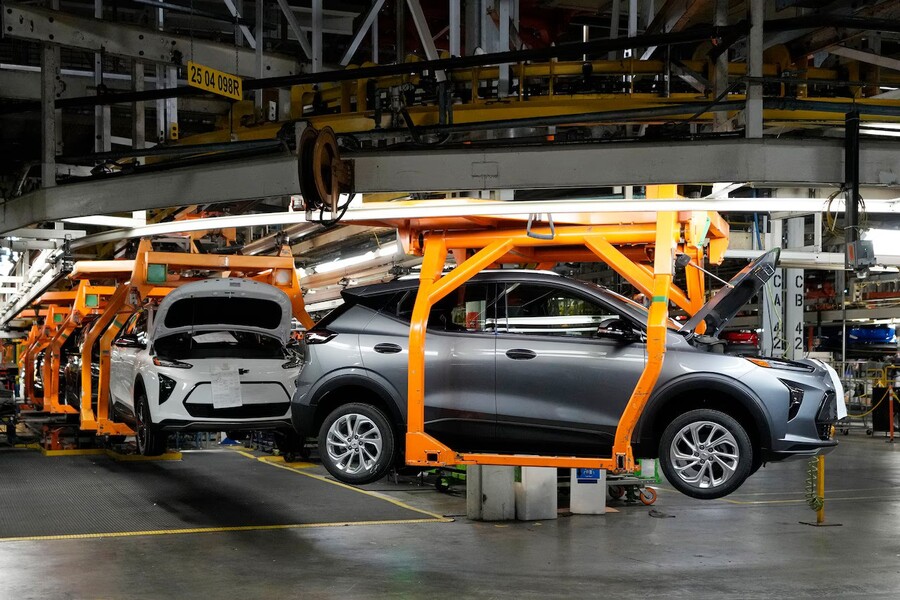General Motors delivered robust financial results for the first quarter of 2025, outpacing Wall Street expectations. However, the automaker is hitting pause on its full-year outlook and 2025 guidance amid growing uncertainty over former President Donald Trump’s proposed auto tariffs.
The Detroit-based company reported a net income of $2.78 billion for the first quarter, translating to $3.35 per share. Adjusted earnings, which exclude one-time charges, came in at $2.78 per share, beating the $2.68 consensus estimate from analysts surveyed by FactSet. Revenue also rose to $44.02 billion, up from $43.01 billion year-over-year.
Despite the strong financial showing, General Motors is deferring its planned investor conference call to Thursday. The decision, executives said, allows time to analyze the potential implications of new tariff measures that may be reinstated or expanded under a potential second Trump administration.
“Our current guidance does not yet reflect the impact of potential tariffs,” GM stated Tuesday, referring to its previously issued forecast of $11 to $12 adjusted earnings per share for the full year 2025.
Trump’s Tariff Plans Send Ripples Through Auto Industry
The reassessment comes in the wake of a Wall Street Journal report on Monday indicating that Donald Trump, who is campaigning for a second term, may revise his tariff approach. Citing anonymous sources, the report said Trump could ease tariffs on foreign parts used in domestic vehicle manufacturing, though he may still impose duties on fully imported vehicles.
Trump’s return to Michigan—the heart of the U.S. auto industry—underscores the political weight of the issue. He’s slated to appear at Selfridge Air National Guard Base alongside Democratic Governor Gretchen Whitmer before addressing supporters at a rally at Macomb Community College in suburban Detroit.
Michigan was one of the pivotal states Trump flipped in his 2016 election victory, but it has since borne the brunt of his tariff-first trade stance. Steep duties on imported cars and components have rattled the state’s economy, contributing to a surge in joblessness.
According to recent labor statistics, Michigan’s unemployment rate has risen for three consecutive months, climbing by 1.3% in March alone to reach 5.5%—well above the national average of 4.2%.
Industry Backlash and Economic Concerns
Auto industry stakeholders have warned the White House that imposing new tariffs on foreign parts could prove economically devastating. Trade groups argue that such policies would raise vehicle prices, suppress sales, and potentially lead to mass layoffs or even bankruptcies across the supply chain.
“Tariffs act like a hidden tax on both manufacturers and consumers,” said one Detroit-based automotive economist. “The short-term gain in domestic sourcing doesn’t outweigh the long-term pain of lost competitiveness and rising production costs.”
GM, like many other automakers, relies heavily on a globally integrated supply chain. Even vehicles assembled in the U.S. include components from Europe, Asia, and Canada. Any disruption in parts imports can drive up production costs and squeeze margins.
What’s Next?
The auto industry—and Wall Street—will be closely watching GM’s Thursday earnings call for updated commentary on how the company plans to respond to the trade policy environment. Analysts expect GM to provide a revised 2025 forecast if more clarity emerges on the tariff landscape.
Until then, investors remain cautious. GM shares fell more than 2% in pre-market trading on Tuesday despite the earnings beat, reflecting broader unease about potential policy shocks during an election year.
For Michigan workers, the stakes are especially high. Any shift in trade policy could reverberate through thousands of jobs in manufacturing, logistics, and support industries.
GM’s move to delay its guidance update underscores just how much the future of the auto sector is now intertwined with the volatile winds of politics—and how closely companies are watching the road ahead.

